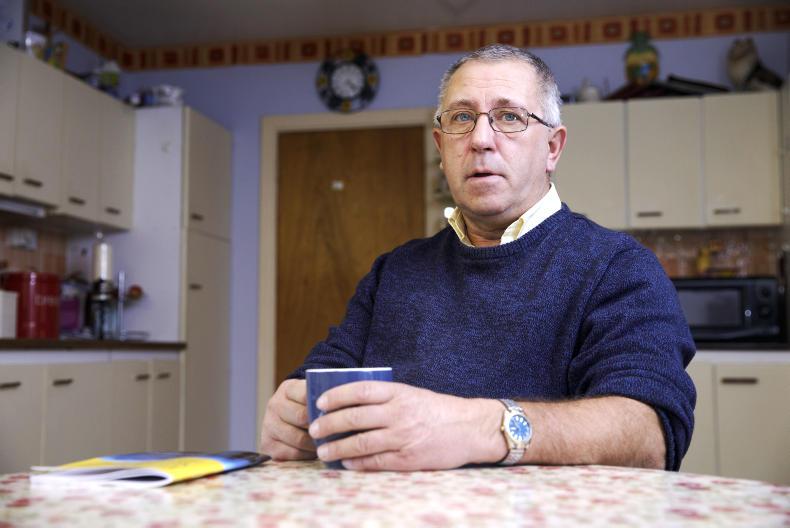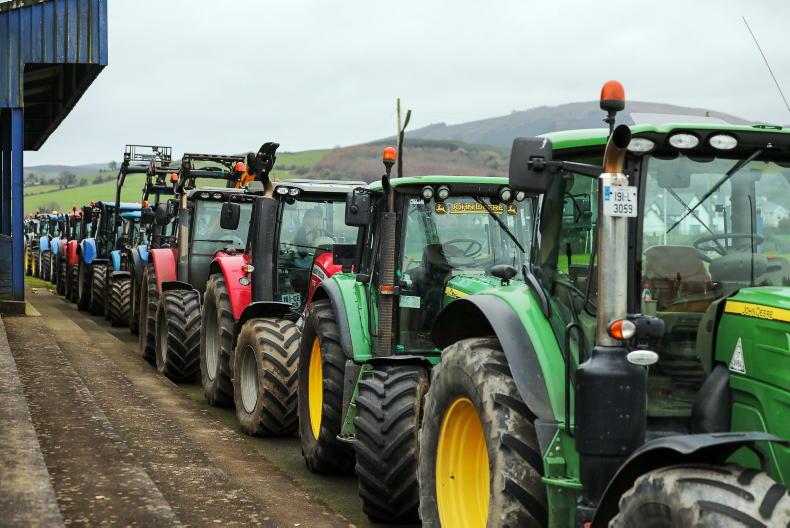It was Christmas week and Tuesday morning, 22 December 2015, started the same as usual for the Clancy family from Kilworth, Co Cork. Dad Noel was feeding cattle at an out-farm. On his return the plan was that he and his wife, Geraldine, would tackle the farm accounts.
Their daughter, Louise, was home from college in Brighton and wanted to get a library book back to UCC, so Geraldine offered to take her to the bus. She and her other daughter, Fiona, planned to do some Christmas shopping later in the day.
“Take your time, I’ll take you shopping later,” she promised. Son Declan was at work.
“Geraldine and I had a chat on the phone. I told her what I was at and she said: ‘I’ll see you then so.’ They were her last words to me,” says Noel.
Shortly afterwards, Noel came upon a collision just a half mile from home. He recalls seeing the four wheels of a car in the air and much of the rest submerged in water. He remembers the noise, the chaos, the desperation on people’s faces. He recalls helping to guide those trying to get the car out of the flooded drain.
He saw it was a dark blue Ford Focus, but it didn’t click. He saw the Munster rugby flag on the side window, but that didn’t register. He saw Louise being taken from the car, but he didn’t recognise her because her hair was all dark instead of its usual blond. Then he saw the number plate – 08C14184 – and the nightmare began.
“I knew Louise was gone, but I was sure Geraldine would make it when she coughed up water. But it wasn’t to be.” Geraldine and Louise Clancy died following an accident when an unaccompanied learner driver drove through a yield right-of-way junction and crashed into the Clancys, whose car then catapulted into a flooded drain, killing them both.

Noel Clancy, Leitrim, Kilworth, Co Cork. \ Donal O' Leary
The ‘what ifs’ won’t let him sleep.
In the three years since the collision, Noel hasn’t had a full night’s sleep. It’s the ‘what ifs’ that keep him awake. The ‘what if’ Louise had gone to see the Christmas lights in London.
“We talked her out of it because of the Paris attacks. So she came home instead and was killed. I find that so hard to accept.”
The ‘what if’ their other daughter, Fiona, had travelled with Louise and her mother and done the shopping planned for later in the day.
“We would have lost all three,” says Noel.
The ‘what if’ Geraldine hadn’t learned to drive.
“When we were going out she wasn’t driving and I convinced her to learn. If I hadn’t done that she might still be alive. I know that is totally mad, but in some corner of my brain it makes perfect sense.
“There are days where you think about one more than the other and you feel guilty for doing it. Ah Jesus, it’s just terrible. You’ve no idea what goes on in my mind.”
And because the collision happened so close to home, Noel often has to pass the spot several times a day.
“I have no choice short of someone building me a bridge. My outside farm is off that road, so if I’m drawing cattle or slurry I could pass it 30 times a day. If I want to go to Cork, Fermoy, Kilworth, Dublin, I have to pass it. And there’s something else he can’t understand. Mass was always very important to Noel and he rarely missed it.
“We went to Knock nearly every year, but we weren’t overly religious. I can’t tell you why, but I can’t go to mass now. I thought it was because I was trying to avoid people here in Ballyduff or in Kilworth, but I drove into Fermoy and I couldn’t make myself do it.”
Changing law for L drivers
Still, life has to go on and Declan is working through his sister’s 77-item bucket list and was married this autumn. Fiona has work and exams, and Noel is coping, just about.
“I was in a dairy farm partnership for 11 years, but I couldn’t do it anymore. Now I rear calves. I re-heated dinners for the first year, but now I can cook with moderate success.”
Having the president of UCC present the family with an honourary degree for Louise was emotional.
“Being invited to the graduation of her year was wicked hard because you’d see the girls there falling off their high heels and you’d imagine Louise there having fun with them.”
This October UCC presented a prize for creative writing to a master’s student at UCC in Louise’s name. That too was emotional.

Louise Clancy.

Geraldine Clancy.
He’s heavily involved in PARC, a group that campaigns to update road traffic legislation, including making the car owner responsible and guilty of an offence if an unaccompanied L driver using their car is involved in an accident.
“When Declan was an L driver we got up at 6am to accompany him, he never put thread on the road alone.
“It took from April to July to get the legislation passed and I was there for nearly every day of the debates, which went on for an unreasonable length of time in an effort to dump the legislation. It had solid supporters and determined opponents, but a key point was that the inquest jury had recommended the change.”
Having been signed into law, it now needs a commencement order to be signed by transport minister Shane Ross.
Recently a counsellor asked Noel how his life had changed since the collision.
“I’d been reading a piece about William Yeats and his line ‘all has changed, changed utterly, a terrible beauty is born’ summed it up. In my life, on the farm, in our home, in every facet of my life all has changed, changed utterly. Grief can and will kill you unless you work yourself through it. And that’s what we are trying to do with the help of family, neighbours and friends.”
Driving down road deaths
Noel is adamant that legislative changes have been critical in reducing the number of people killed and injured on our roads. In 1972, a staggering 640 people died on Irish roads and almost 9,000 were injured, and we only had a fraction of today’s traffic levels. By the mid-1980s the figure had fallen to 436. Today it’s between 150-160 deaths a year.
Changes to seat belt rules, drink driving limits and the requirement for an NCT were directly responsible for the change. So too were new rules on L drivers.
Yet more can be done, he says: “There are massive numbers of people on their sixth or more test and that needs to be addressed with more testers. On the plus side, families used have to pay for all the reports coming from a case and it could cost anything from €5,000 to €10,000 by the time they were finished. Noreen O’Sullivan abolished those charges and that came into effect in January 2017.”
Non-presentation of driving licences in court is another issue.
“If someone is banned and doesn’t produce a driving licence even after being asked to, the next time they are stopped the ban won’t appear and they will be let drive on.”
Read more
Love and loss: 'Mam was elegant, but with a wild streak'
Goodbye, My Son: Marian O'Mahony on coping with the terminal illness of a child
It was Christmas week and Tuesday morning, 22 December 2015, started the same as usual for the Clancy family from Kilworth, Co Cork. Dad Noel was feeding cattle at an out-farm. On his return the plan was that he and his wife, Geraldine, would tackle the farm accounts.
Their daughter, Louise, was home from college in Brighton and wanted to get a library book back to UCC, so Geraldine offered to take her to the bus. She and her other daughter, Fiona, planned to do some Christmas shopping later in the day.
“Take your time, I’ll take you shopping later,” she promised. Son Declan was at work.
“Geraldine and I had a chat on the phone. I told her what I was at and she said: ‘I’ll see you then so.’ They were her last words to me,” says Noel.
Shortly afterwards, Noel came upon a collision just a half mile from home. He recalls seeing the four wheels of a car in the air and much of the rest submerged in water. He remembers the noise, the chaos, the desperation on people’s faces. He recalls helping to guide those trying to get the car out of the flooded drain.
He saw it was a dark blue Ford Focus, but it didn’t click. He saw the Munster rugby flag on the side window, but that didn’t register. He saw Louise being taken from the car, but he didn’t recognise her because her hair was all dark instead of its usual blond. Then he saw the number plate – 08C14184 – and the nightmare began.
“I knew Louise was gone, but I was sure Geraldine would make it when she coughed up water. But it wasn’t to be.” Geraldine and Louise Clancy died following an accident when an unaccompanied learner driver drove through a yield right-of-way junction and crashed into the Clancys, whose car then catapulted into a flooded drain, killing them both.

Noel Clancy, Leitrim, Kilworth, Co Cork. \ Donal O' Leary
The ‘what ifs’ won’t let him sleep.
In the three years since the collision, Noel hasn’t had a full night’s sleep. It’s the ‘what ifs’ that keep him awake. The ‘what if’ Louise had gone to see the Christmas lights in London.
“We talked her out of it because of the Paris attacks. So she came home instead and was killed. I find that so hard to accept.”
The ‘what if’ their other daughter, Fiona, had travelled with Louise and her mother and done the shopping planned for later in the day.
“We would have lost all three,” says Noel.
The ‘what if’ Geraldine hadn’t learned to drive.
“When we were going out she wasn’t driving and I convinced her to learn. If I hadn’t done that she might still be alive. I know that is totally mad, but in some corner of my brain it makes perfect sense.
“There are days where you think about one more than the other and you feel guilty for doing it. Ah Jesus, it’s just terrible. You’ve no idea what goes on in my mind.”
And because the collision happened so close to home, Noel often has to pass the spot several times a day.
“I have no choice short of someone building me a bridge. My outside farm is off that road, so if I’m drawing cattle or slurry I could pass it 30 times a day. If I want to go to Cork, Fermoy, Kilworth, Dublin, I have to pass it. And there’s something else he can’t understand. Mass was always very important to Noel and he rarely missed it.
“We went to Knock nearly every year, but we weren’t overly religious. I can’t tell you why, but I can’t go to mass now. I thought it was because I was trying to avoid people here in Ballyduff or in Kilworth, but I drove into Fermoy and I couldn’t make myself do it.”
Changing law for L drivers
Still, life has to go on and Declan is working through his sister’s 77-item bucket list and was married this autumn. Fiona has work and exams, and Noel is coping, just about.
“I was in a dairy farm partnership for 11 years, but I couldn’t do it anymore. Now I rear calves. I re-heated dinners for the first year, but now I can cook with moderate success.”
Having the president of UCC present the family with an honourary degree for Louise was emotional.
“Being invited to the graduation of her year was wicked hard because you’d see the girls there falling off their high heels and you’d imagine Louise there having fun with them.”
This October UCC presented a prize for creative writing to a master’s student at UCC in Louise’s name. That too was emotional.

Louise Clancy.

Geraldine Clancy.
He’s heavily involved in PARC, a group that campaigns to update road traffic legislation, including making the car owner responsible and guilty of an offence if an unaccompanied L driver using their car is involved in an accident.
“When Declan was an L driver we got up at 6am to accompany him, he never put thread on the road alone.
“It took from April to July to get the legislation passed and I was there for nearly every day of the debates, which went on for an unreasonable length of time in an effort to dump the legislation. It had solid supporters and determined opponents, but a key point was that the inquest jury had recommended the change.”
Having been signed into law, it now needs a commencement order to be signed by transport minister Shane Ross.
Recently a counsellor asked Noel how his life had changed since the collision.
“I’d been reading a piece about William Yeats and his line ‘all has changed, changed utterly, a terrible beauty is born’ summed it up. In my life, on the farm, in our home, in every facet of my life all has changed, changed utterly. Grief can and will kill you unless you work yourself through it. And that’s what we are trying to do with the help of family, neighbours and friends.”
Driving down road deaths
Noel is adamant that legislative changes have been critical in reducing the number of people killed and injured on our roads. In 1972, a staggering 640 people died on Irish roads and almost 9,000 were injured, and we only had a fraction of today’s traffic levels. By the mid-1980s the figure had fallen to 436. Today it’s between 150-160 deaths a year.
Changes to seat belt rules, drink driving limits and the requirement for an NCT were directly responsible for the change. So too were new rules on L drivers.
Yet more can be done, he says: “There are massive numbers of people on their sixth or more test and that needs to be addressed with more testers. On the plus side, families used have to pay for all the reports coming from a case and it could cost anything from €5,000 to €10,000 by the time they were finished. Noreen O’Sullivan abolished those charges and that came into effect in January 2017.”
Non-presentation of driving licences in court is another issue.
“If someone is banned and doesn’t produce a driving licence even after being asked to, the next time they are stopped the ban won’t appear and they will be let drive on.”
Read more
Love and loss: 'Mam was elegant, but with a wild streak'
Goodbye, My Son: Marian O'Mahony on coping with the terminal illness of a child












SHARING OPTIONS